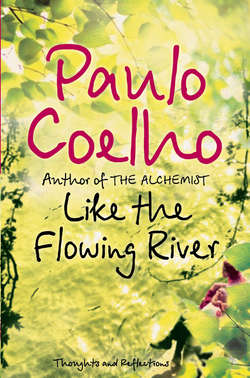Читать книгу Like the Flowing River: Thoughts and Reflections - Пауло Коэльо - Страница 13
The Importance of Looking
ОглавлениеAt first, Theo Wierema was merely a very persistent individual. For five years, he kept sending letters to my office in Barcelona, inviting me to give a talk in The Hague, in Holland.
For five years, my office replied that my diary was full. My diary was not, in fact, always full, but a writer is not necessarily someone who speaks well in public. Besides, everything I need to say is in the books and articles I write, which is why I always try to avoid giving lectures.
Theo found out that I was going to record a programme for a Dutch television channel. When I went downstairs to start filming, he was waiting for me in the hotel lobby. He introduced himself and asked if he could go with me, saying: ‘I’m not one of those people who simply won’t take “No” for an answer; I think I may just be going the wrong way about achieving my goal.’
We must struggle for our dreams, but we must also know that, when certain paths prove impossible, it would be best to save our energies in order to travel other roads. I could have simply said ‘No’ (I have said and heard this word many times), but I decided to adopt a more diplomatic approach: I would impose conditions that would be impossible for him to meet.
I said that I would give the lecture for free, but the entrance fee must not exceed two euros, and the hall must contain no more than two hundred people.
Theo agreed.
‘You’re going to spend more than you’re going to earn,’ I warned him. ‘By my calculation, the cost of the air ticket and hotel alone will cost three times what you will earn if you manage to fill the hall. Then there’s the advertising and the hire of the hall…’
Theo interrupted me, saying that none of this mattered. He was doing this because of what he could see happening in his work.
‘I organize events like this because I need to keep believing that human beings are still in search of a better world. I need to contribute to making this possible.’
What was his work?
‘I sell churches.’
And, to my amazement, he went on: ‘I’m employed by the Vatican to select buyers, because there are more churches than there are church-goers in Holland. And since we’ve had some terrible experiences in the past, with sacred places being turned into nightclubs, condominiums, boutiques, and even sex-shops, the system of selling churches has changed. The project has to be approved by the community, and the buyer has to say what he or she is going to do with the building. We normally only accept proposals that include a cultural centre, a charitable institution, or a museum. And what has this to do with the lecture, and with the other events I’m trying to organize? People don’t really meet together any more, and if they don’t meet, they won’t grow.’
Looking at me hard, he concluded: ‘Meetings. That was the mistake I made with you. Instead of just sending e-mails, I should have shown you that I’m made of flesh and blood. Once, when I failed to get a reply from a particular politician, I went and knocked on his door, and he said to me: “If you want something, you need to look the other person in the eye.” Ever since then, that’s what I’ve done, and I’ve had nothing but good results. You can have at your disposal all the means of communication in the world, but nothing, absolutely nothing, can replace looking someone in the eye.’
Needless to say, I accepted his proposal.
P.S. When I went to The Hague to give the lecture, and knowing that my wife, who is an artist, has always wanted to set up a cultural centre, I asked to see some of the churches that were for sale. I asked the price of one which used to hold 500 parishioners every Sunday, and it cost one euro (ONE euro!), but the maintenance costs can reach prohibitive levels.
